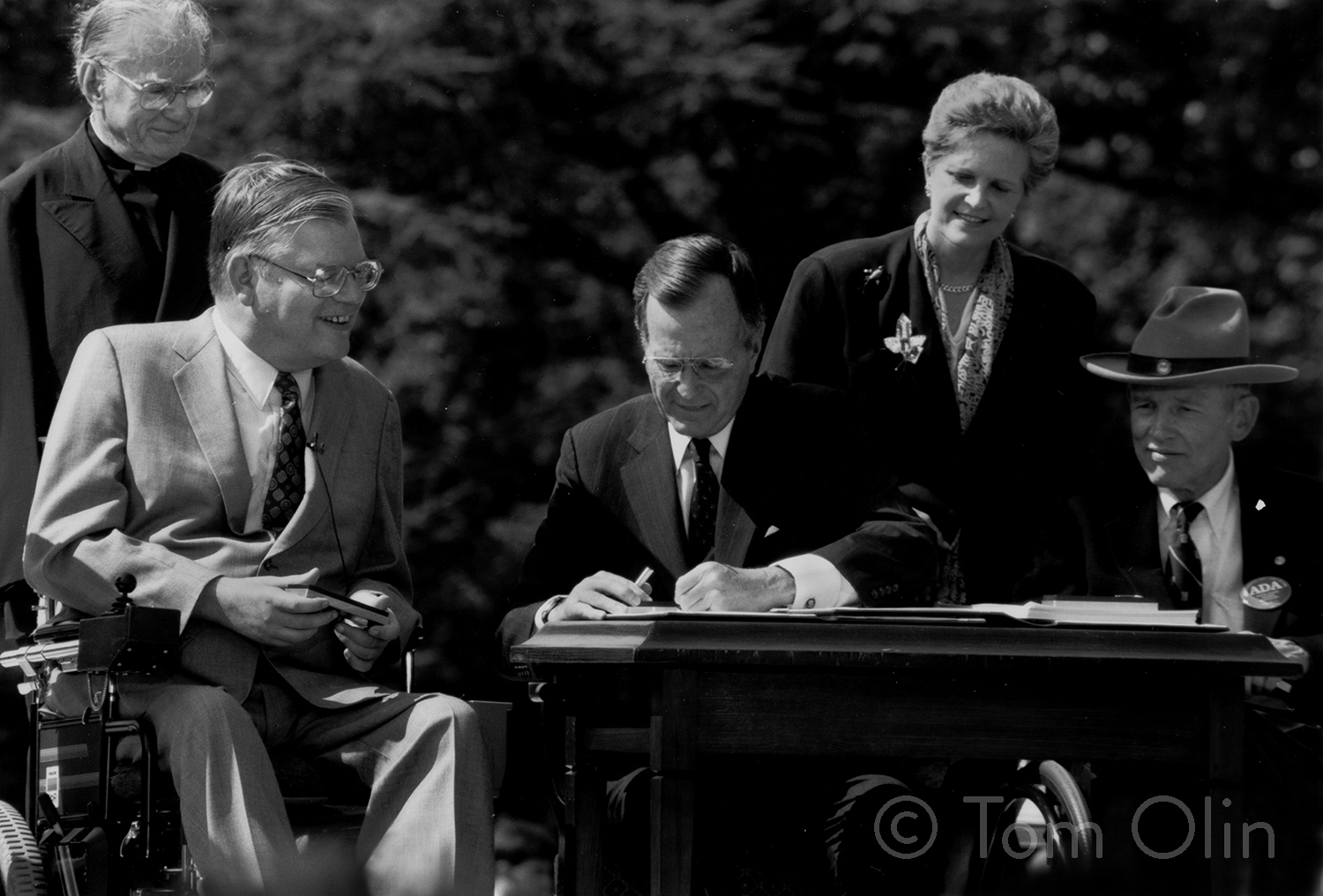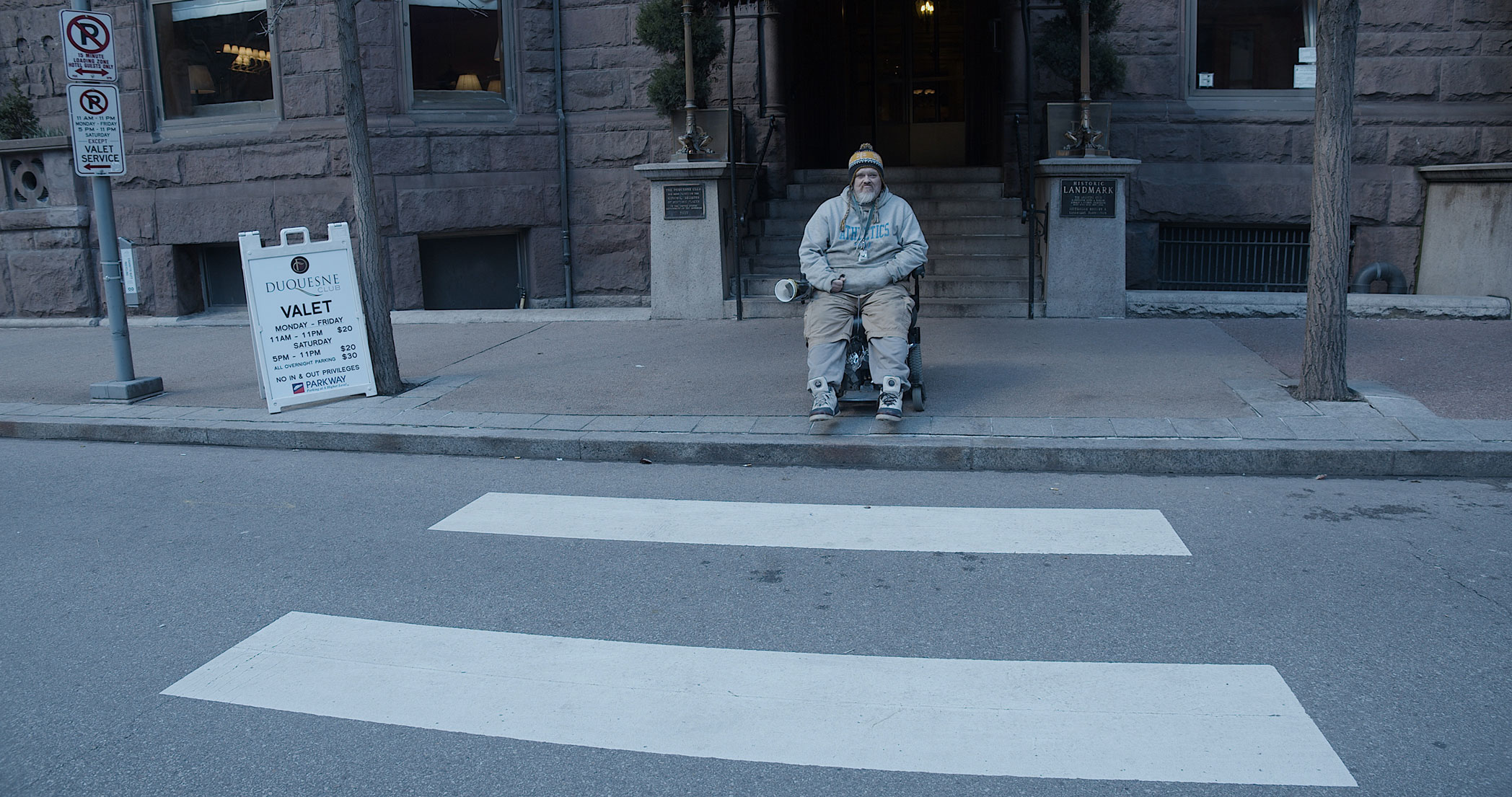Faces of the law: The Americans with Disabilities Act read by those it protects
Equality. Independence. Self-sufficiency.
These are key goals for people covered by the Americans with Disabilities Act of 1990. The ADA affirmed that this is what our country should aim to achieve for people who are blind, deaf, unable to speak, using wheelchairs, living with autism, bipolar disorder or myriad other disabilities.
Then-President George H. W. Bush, with bipartisan support in the Congress, signed this act and affirmed the civil rights of people with disabilities.

Photo of President George H.W. Bush signing into law the Americans with Disabilities Act of 1990 on the South Lawn of the White House. (Used by permission. © Tom Olin – Tom Olin Collection)
At that time, 30 years ago, Allegheny County’s buses had no wheelchair lifts — nor did many around the country. Sign language interpretation was rarely afforded at public meetings. Many people with physical and mental disabilities were housed in sprawling institutions in remote locations with little opportunity for education or rehabilitation.
Now at a bus stop, you’ll often see the driver lower a ramp for a person in a wheelchair. People with intellectual disabilities are essential workers at grocery stores. Stoplights beep so people who are blind can safely cross intersections.
And yet the promise of the ADA is not fully realized. On many Pittsburgh streets, you’ll see a single step at a door that stops people in wheelchairs from getting in. Many people who are blind can’t easily navigate the websites that many of us rely on for every facet of life. And negative attitudes toward people with disabilities still exist; several have shared that while many physical accommodations are made, some store owners or internet trolls still isolate them—intentionally or without thinking of it.

Crosswalks in the middle of long streets aren't always accessible to people in wheelchairs. This man sits at the edge of a Pittsburgh sidewalk on Sixth Avenue between Wood and Smithfield streets. The ADA promotes independent movement, but it has not been fully achieved. (Photo by Alex Collinger)
For this project, a beauty queen, two accomplished parathletes, a Steelers fan and 10 other people from our region—all of whom have disabilities—read a passage from the ADA. They took time off work and traveled to downtown Pittsburgh from all over the region to sit under studio lights, look directly into the camera and read both unpleasant truths and aspirations. Some stayed and shared their personal stories—some of which are included in companion podcasts that will run throughout the two weeks of this project.
![]()
Eric "Trainwreck" Burkett has traveled around the world competing in archery. He lost his legs after a plane crash while he was in the Marines. The ADA says the "nation's proper goals" for people with disabilities include "full participation" in society in many areas, including recreation. [Note: The video is mostly silent.] (Video by Alex Collinger)
The on-camera readers were filmed by an inclusive recording crew. Three on the crew support people with intellectual disabilities in group homes. A trio of producers from the Joey Travolta/Arts for Autism Film Camp were employed in developing the concept and in production. Alex Collinger, who was first trained at the camp and then became an employee, was the lead videographer. This team was brought together by the All-Abilities Media Project in which people with disabilities receive production training and paid experience in media skills. It’s a collaboration between Unabridged Press housed at the Center for Media Innovation at Point Park University. PublicSource visual producer Ryan Loew also helped to consult and work on the video.
After watching people reading the ADA and hearing their stories, the team was left with many questions. Will we ever achieve the spirit and the letter of this law? And who loses if we don’t? The people in this video and affiliated podcasts and writing offer a glimpse.
(Note— After the killing of George Floyd at the hands of a Minneapolis police officer and ensuing protests against racism and police brutality, we chose not to use excerpts of the ADA that describe racism and other kinds of discrimination as bygones.)
Reach Jennifer Szweda Jordan at jennifer@unabridgedpress.com.
Intro:
(Light music; grid of speakers' images and project title 'ADA at 30: Accessibility in Pittsburgh' appears)
Dustin Schneider:
(sitting with his dog, Spangle) Discrimination against individuals with disabilities
David Hale:
continues to be a serious and pervasive social problem.
Adriana Quinones:
La discriminacio`n contra personas con discapacidad continúa ser un problema social serio y pervasivo. (Discrimination against people with disabilities continues to be a serious and pervasive social problem.)
James Shirley:
Discrimination against individuals with disabilities persists
Puneet Kumar:
in such critical areas as employment, housing, public accommodations,
Rich McGann & Rich Patton:
(both men are signing) education, transportation, communication, recreation,
Mon Still:
recreation, institutionalization, health service,
Isabel Ruiz:
(signing as she talks) voting and access to public services.
James Shirley:
Individuals with disabilities continually
Dustin Schneider:
(sitting with his dog, Spangle) encounter various forms of discrimination,
Richard St. John:
including outright intentional exclusion, the discriminatory effects of architectural,
Puneet Kumar:
transportation and communication barriers, overprotective rules and policies,
Rich McGann & Rich Patton:
(both men are signing) failure to make modifications to existing facilities and practices,
John Siciliano:
exclusionary qualification standards and criteria, segregation and relegation to lesser services,
Myron Ellis:
programs, activities, benefits, jobs or other opportunities.
Isabel Ruiz:
(signing as she talks) Census data, national polls and other studies have documented that people with disabilities, as a group,
John Siciliano:
occupy an inferior status in our society and are severely disadvantaged
David Hale:
socially, vocationally, economically, and educationally.
Mon Still:
The nation's proper goals regarding individuals with disabilities are to assure the equality
Richard “Eric/Train Wreck” Burkett:
of opportunity, full participation, independent living and economic self-sufficiency.